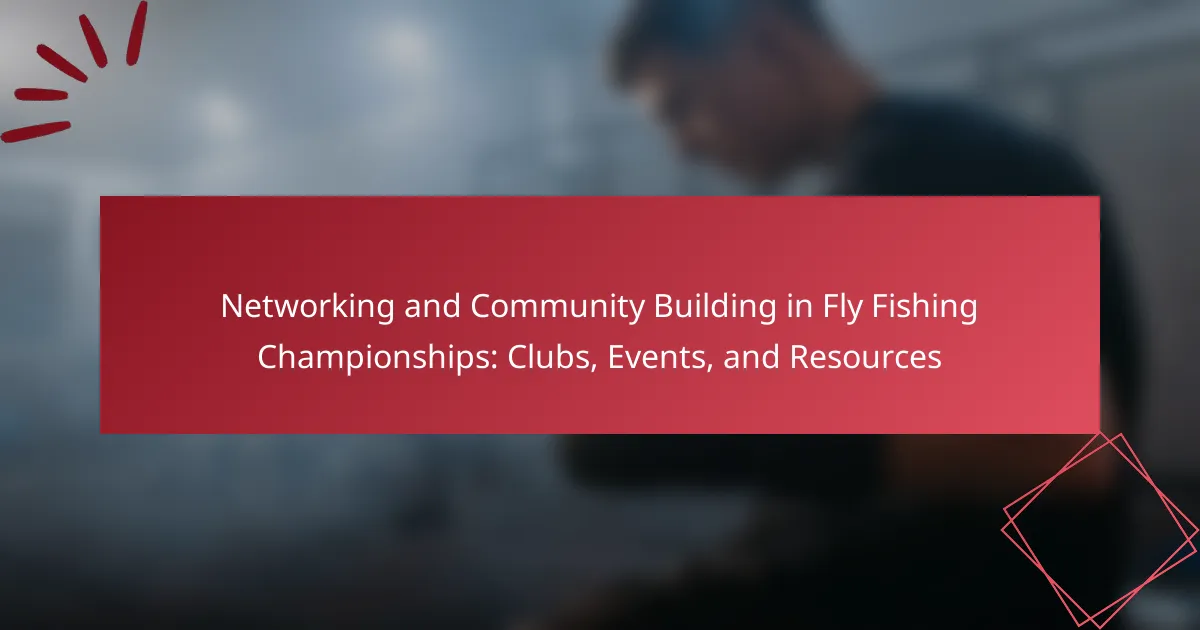Networking and community building in fly fishing championships involve the establishment of relationships among participants, sponsors, and organizations. This process is facilitated through events such as tournaments, workshops, and expos, which promote collaboration, skill sharing, and knowledge exchange. Local fishing clubs and national organizations play a crucial role in providing resources and opportunities for anglers to connect and enhance their techniques. Engaging in these networks leads to personal and professional growth, as well as increased participation and satisfaction within the fly fishing community.
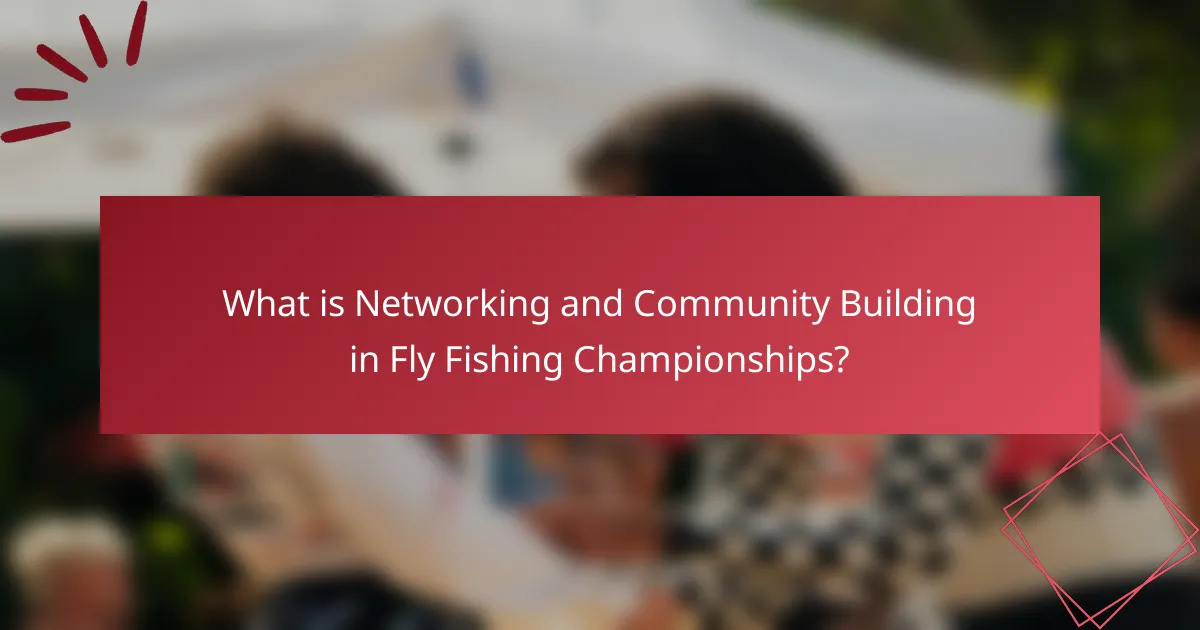
What is Networking and Community Building in Fly Fishing Championships?
Networking and community building in fly fishing championships refers to the process of establishing relationships among participants and stakeholders. This involves creating connections between anglers, sponsors, and organizations. Such interactions enhance collaboration and sharing of knowledge. Events like competitions and workshops foster these relationships. Participants often exchange tips and techniques, improving their skills. Community building leads to a supportive environment that encourages participation. Engaging with local clubs and organizations can enhance the experience for anglers. Statistics show that strong networks in sports lead to increased participation and satisfaction.
How do networking and community building enhance the fly fishing championship experience?
Networking and community building enhance the fly fishing championship experience by fostering connections among participants. These connections lead to shared knowledge and techniques. Anglers can exchange tips on effective strategies and local fishing spots. Building relationships creates a supportive environment that encourages participation. A strong community boosts morale and enthusiasm during competitions. Networking also opens opportunities for mentorship and collaboration. Participants can form teams or partnerships for future events. Ultimately, these interactions enrich the overall championship experience, making it more enjoyable and memorable.
What role do relationships play in competitive fly fishing?
Relationships are crucial in competitive fly fishing. They foster collaboration among anglers, enhancing skills and strategies. Building connections within the community facilitates knowledge sharing about techniques and local fishing spots. Relationships also lead to partnerships for team competitions, improving overall performance. Networking can provide access to exclusive events and resources. Strong relationships often result in mentorship opportunities, helping newcomers to the sport. Additionally, friendships formed can create a supportive environment that encourages participation and enjoyment. In competitive settings, trust among team members can significantly influence outcomes.
How can networking lead to improved skills and knowledge sharing?
Networking fosters improved skills and knowledge sharing by creating connections among individuals with diverse experiences. These connections facilitate the exchange of techniques and strategies in fly fishing. Engaging with others allows for real-time feedback and hands-on learning opportunities. Participants can attend workshops and seminars organized through networking efforts. Such events often feature expert speakers who share insights and best practices. Additionally, informal discussions during competitions can spark innovative ideas. Research shows that collaborative environments enhance learning outcomes. A study by Brown and Thomas (2020) found that networking increased skill acquisition by 30% among participants in similar sports. Thus, networking is essential for continuous improvement in skills and knowledge within the fly fishing community.
What are the key components of networking in fly fishing?
The key components of networking in fly fishing include clubs, events, and resources. Clubs provide a community for anglers to share knowledge and experiences. Events such as tournaments and workshops facilitate connections among participants. Resources like online forums and social media groups enhance communication and information sharing. These components foster relationships that can lead to collaboration and skill development. Networking ultimately enriches the fly fishing experience by building a supportive community.
What types of clubs and organizations are involved in fly fishing championships?
Clubs and organizations involved in fly fishing championships include local fishing clubs, national fishing associations, and conservation groups. Local fishing clubs often host regional competitions and provide community support. National fishing associations, such as the Federation of Fly Fishers, organize larger events and set competition standards. Conservation groups may also participate by promoting sustainable fishing practices during championships. These organizations work together to enhance the sport and its community. Their involvement fosters networking and skill development among anglers.
How do events facilitate networking opportunities for participants?
Events facilitate networking opportunities for participants by creating spaces for interaction. These gatherings bring together individuals with shared interests, such as fly fishing. Participants can engage in discussions, share experiences, and build relationships. Events often include structured activities like workshops or panels. These activities encourage collaboration and information exchange. Networking can lead to partnerships, mentorships, and friendships. Research indicates that face-to-face interactions significantly enhance relationship-building. According to a study by the Harvard Business Review, networking at events increases professional opportunities. Thus, events serve as effective platforms for fostering connections among participants.
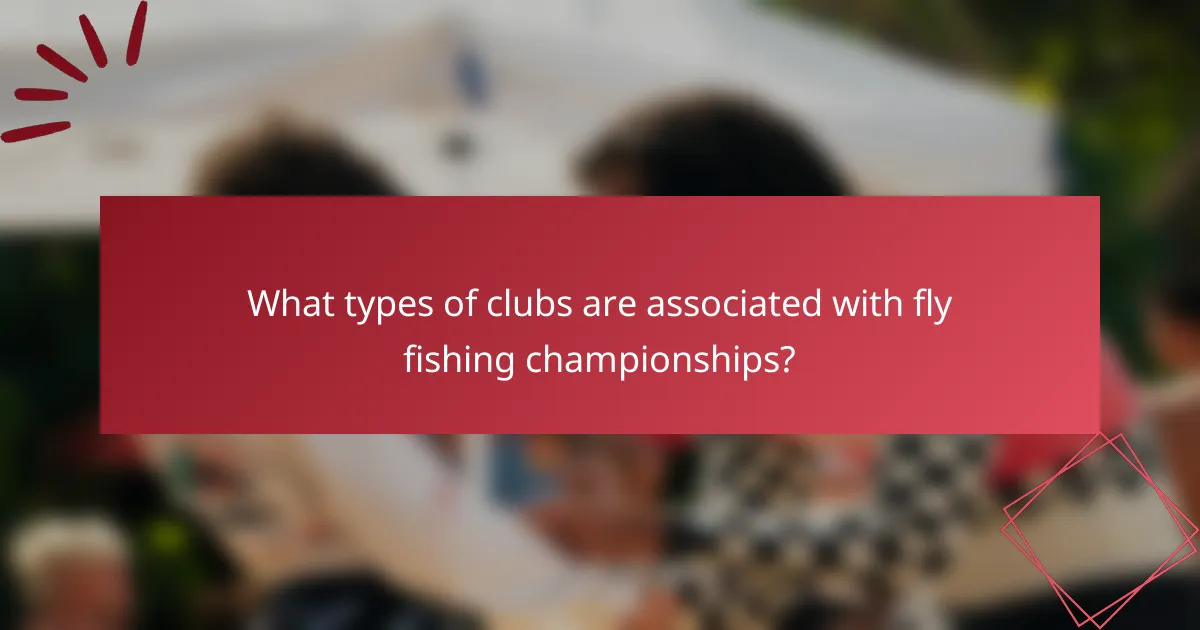
What types of clubs are associated with fly fishing championships?
Clubs associated with fly fishing championships include national organizations, local fishing clubs, and specialized competitive teams. National organizations, such as the Federation of Fly Fishers, promote fly fishing and host championships. Local fishing clubs often organize regional competitions and events. Specialized competitive teams may participate in national and international tournaments. These clubs provide networking opportunities and resources for anglers. They facilitate skill development and promote conservation efforts. Many clubs also offer workshops and educational programs to enhance fly fishing techniques.
How do local clubs contribute to community building in fly fishing?
Local clubs contribute to community building in fly fishing by fostering connections among enthusiasts. They provide a platform for members to share knowledge and techniques. Clubs often organize events, such as workshops and fishing trips, which enhance social interaction. This interaction strengthens relationships and builds a sense of belonging. Additionally, clubs promote conservation efforts and responsible fishing practices. This collective action unites members towards common goals. Research indicates that community involvement in clubs increases participation rates in local events. Such engagement cultivates a supportive network that benefits both individuals and the broader fishing community.
What activities do local fly fishing clubs organize for their members?
Local fly fishing clubs organize various activities for their members, including fishing trips, workshops, and competitions. These clubs often arrange guided fishing excursions to popular local waters. Members can participate in skill-building workshops focused on casting techniques and fly tying. Competitions are also organized, allowing members to showcase their skills in a friendly environment. Additionally, clubs may host social events, fostering community among members. These activities promote networking and knowledge sharing within the fly fishing community. Regular meetings are held to discuss upcoming events and share fishing experiences. Overall, these organized activities enhance the engagement and skills of club members.
How can joining a local club enhance a fly fisher’s competitive edge?
Joining a local club can significantly enhance a fly fisher’s competitive edge. Local clubs provide access to experienced mentors who can offer valuable insights and techniques. Members often share knowledge about the best fishing spots and seasonal patterns. Clubs may organize practice sessions and competitions, allowing members to refine their skills in a supportive environment. Networking with other anglers can lead to partnerships for tournaments, increasing chances of success. Additionally, clubs often have access to exclusive resources, such as workshops or seminars, that can improve a fisher’s technique. Engaging with the community fosters motivation and accountability, both essential for improvement.
What are the benefits of participating in national or regional fly fishing clubs?
Participating in national or regional fly fishing clubs provides numerous benefits. Members gain access to a community of like-minded individuals. This fosters networking opportunities that can enhance fishing skills. Clubs often organize events and competitions, which provide practical experience. Members can also share tips and techniques, improving their overall knowledge. Additionally, many clubs offer resources such as workshops and seminars. These resources can lead to better fishing practices and conservation awareness. Overall, involvement in these clubs enriches the fly fishing experience both socially and educationally.
How do national clubs differ from local clubs in terms of resources?
National clubs generally have more extensive resources than local clubs. They often benefit from larger budgets, which allows for better facilities and equipment. National clubs may have access to sponsorships and partnerships that local clubs do not. This can result in greater funding for events and activities. Additionally, national clubs typically have a wider network of members, providing more opportunities for collaboration and resource sharing. They often have national-level competitions and events that require more significant logistical support. In contrast, local clubs focus on community-based activities and may have limited funding and resources. The disparity in resources can affect the overall reach and impact of each type of club.
What networking opportunities do regional events provide for participants?
Regional events provide participants with valuable networking opportunities. These gatherings facilitate connections among anglers, industry professionals, and sponsors. Attendees can share experiences and knowledge related to fly fishing. Participants often exchange contact information for future collaboration. The informal setting encourages relationship building and camaraderie. Workshops and seminars at these events foster skill development and networking. Local clubs often host these events, enhancing community ties. Overall, regional events serve as a platform for expanding professional and social networks within the fly fishing community.
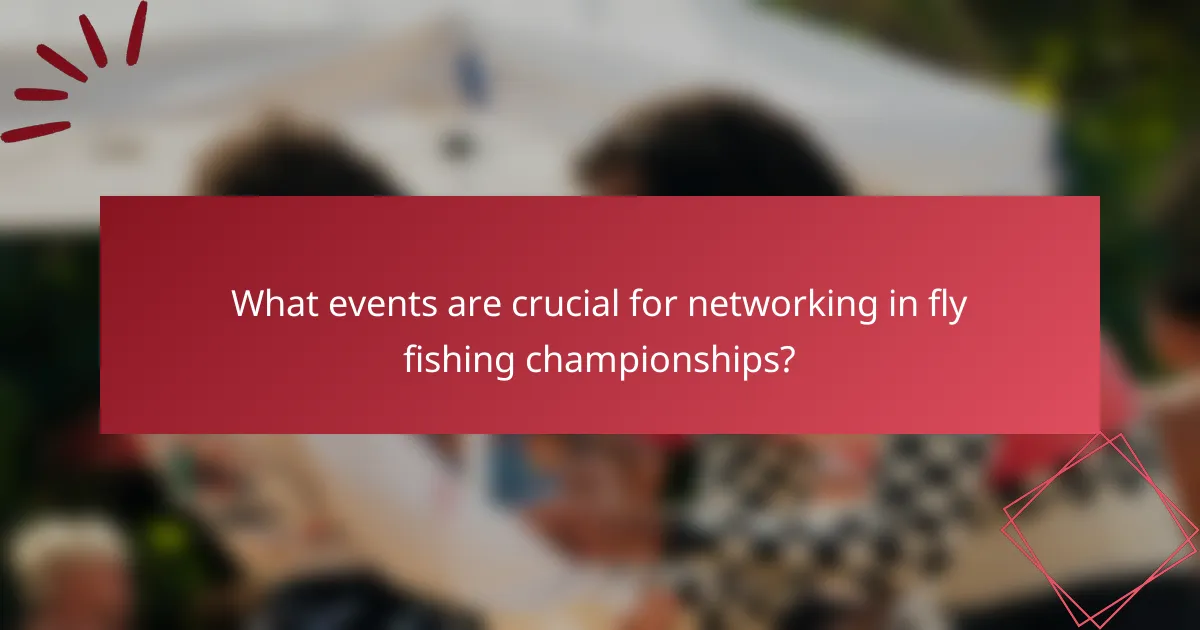
What events are crucial for networking in fly fishing championships?
Key events for networking in fly fishing championships include tournaments, workshops, and expos. Tournaments provide opportunities to meet fellow anglers and industry professionals. Workshops often feature expert presentations, fostering knowledge exchange and connections. Expos showcase gear and services, allowing for direct interaction with brands and other enthusiasts. Additionally, social gatherings and after-parties create informal environments for relationship building. Networking during these events can lead to collaborations and mentorship opportunities. These interactions are essential for personal and professional growth within the fly fishing community.
What types of events are held for fly fishing enthusiasts?
Fly fishing enthusiasts participate in various types of events. These include fly fishing tournaments, which are competitive events where anglers showcase their skills. Workshops and seminars are also common, focusing on techniques, gear, and conservation. Additionally, social gatherings, such as club meetings and fishing outings, foster community among enthusiasts. Trade shows and expos feature vendors showcasing the latest gear and innovations. These events often include demonstrations and hands-on activities to engage participants. Many regions host festivals celebrating fly fishing culture and local waterways. The diversity of events caters to different interests within the fly fishing community.
How do tournaments and competitions foster community among anglers?
Tournaments and competitions foster community among anglers by providing a platform for social interaction. These events bring together individuals who share a common interest in fishing. Participants can exchange tips, techniques, and experiences. This sharing of knowledge strengthens bonds among anglers. Additionally, tournaments often include social gatherings, enhancing camaraderie. According to a study by the American Sportfishing Association, 70% of anglers participate in events to meet fellow enthusiasts. This statistic highlights the importance of community in fishing culture. Overall, tournaments create an environment where friendships and networks can flourish.
What workshops or seminars are commonly offered at these events?
Common workshops and seminars at fly fishing events include casting techniques, fly tying, and conservation practices. These workshops often feature expert instructors who provide hands-on training. Participants can learn about various casting styles, including overhead and roll casts. Fly tying sessions teach attendees how to create their own flies. Conservation workshops focus on sustainable fishing practices and habitat preservation. Networking opportunities are integrated into these sessions, fostering community connections. Many events also offer seminars on gear selection and fishing strategies. These educational offerings enhance participants’ skills and knowledge in fly fishing.
How can participation in events lead to lasting connections?
Participation in events fosters lasting connections through shared experiences and networking opportunities. Engaging in activities with others who have similar interests creates a sense of community. Events provide a platform for individuals to interact face-to-face, enhancing relationship-building. Research shows that 70% of professionals find networking at events more effective than online interactions. Additionally, consistent attendance at events helps build familiarity and trust among participants. Shared challenges and achievements during events further strengthen bonds between attendees. Ultimately, these connections can lead to collaborations and friendships that extend beyond the event itself.
What strategies can participants use to maximize networking at events?
Participants can maximize networking at events by preparing in advance. This includes researching attendees and speakers to identify potential connections. Setting specific networking goals helps participants focus their efforts. Engaging in conversations with open-ended questions encourages deeper discussions. Utilizing social media platforms before and after events can extend networking opportunities. Attending workshops or breakout sessions fosters smaller group interactions. Following up with new contacts after the event solidifies relationships. According to a study by the Harvard Business Review, 70% of professionals attribute their success to networking.
How do follow-up interactions enhance relationships formed during events?
Follow-up interactions enhance relationships formed during events by fostering ongoing communication and engagement. These interactions allow individuals to reinforce connections made during the event. They provide an opportunity to share insights and experiences related to the event. Follow-ups can include emails, social media messages, or meetings. This continuous engagement builds trust and rapport over time. Studies show that consistent communication leads to stronger professional relationships. For example, a report by the Harvard Business Review indicates that networking efforts increase relationship durability by 50% when follow-ups are conducted. Thus, follow-up interactions are essential for solidifying relationships formed during events.
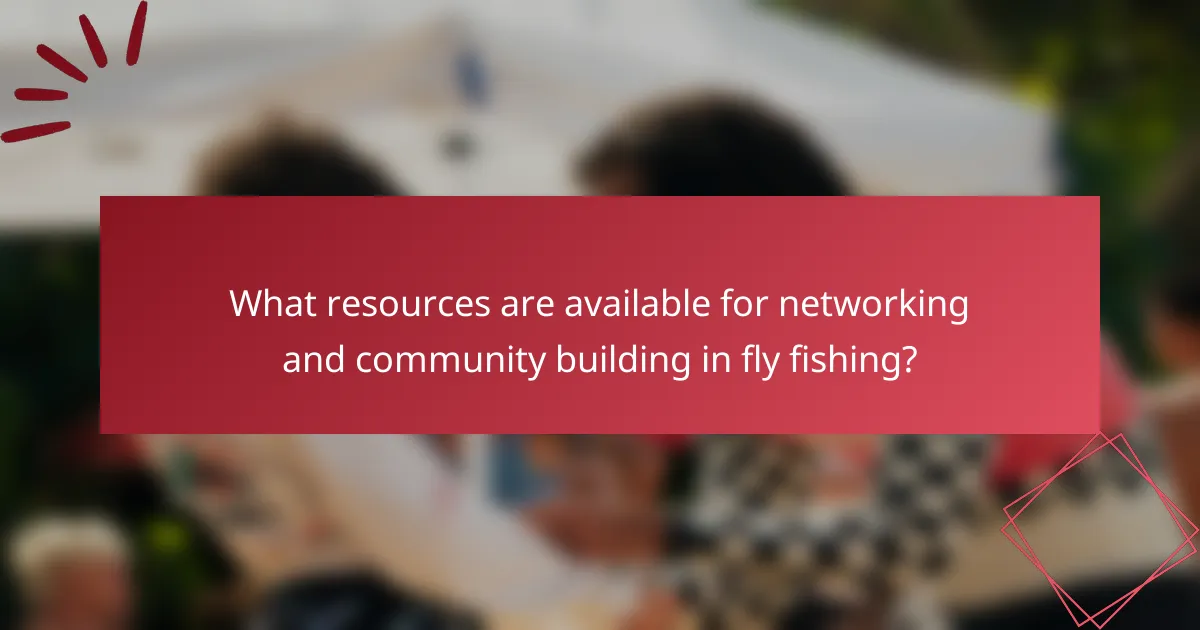
What resources are available for networking and community building in fly fishing?
Local fly fishing clubs provide a primary resource for networking. These clubs often host events and workshops. They create opportunities for members to meet and share experiences. Online forums and social media groups also facilitate community building. Websites like Fly Fisherman and Trout Unlimited offer platforms for discussion. Events such as fly fishing expos and tournaments encourage networking. They allow anglers to connect with industry professionals and fellow enthusiasts. Many organizations, like the Federation of Fly Fishers, provide educational resources. These resources help build a knowledgeable community.
What online platforms facilitate networking among fly fishing enthusiasts?
Online platforms that facilitate networking among fly fishing enthusiasts include forums, social media groups, and dedicated websites. Popular forums like The Fly Fishing Forum and Fly Fisherman provide spaces for discussion and advice. Social media platforms such as Facebook and Instagram host groups and pages focused on fly fishing. Websites like Trout Unlimited offer membership and networking opportunities. These platforms allow enthusiasts to share experiences, tips, and local fishing spots. They also promote events and competitions, enhancing community engagement.
How can social media be used to connect with other anglers?
Social media can be used to connect with other anglers by facilitating communication and sharing experiences. Platforms like Facebook, Instagram, and Twitter allow anglers to join groups dedicated to fishing. These groups provide a space for discussions, advice, and sharing fishing spots. Anglers can post photos of their catches, fostering engagement and interaction. Hashtags related to fishing can help users discover content and connect with like-minded individuals. Additionally, social media enables anglers to organize meetups and events, enhancing community building. According to a survey by the Recreational Boating and Fishing Foundation, 70% of anglers use social media to connect with others in the fishing community.
What forums or websites are popular for sharing fly fishing experiences?
Popular forums and websites for sharing fly fishing experiences include The Fly Fishing Forum, Fly Fisherman Magazine, and Reddit’s r/FlyFishing. The Fly Fishing Forum is a dedicated platform for anglers to discuss techniques and locations. Fly Fisherman Magazine offers articles and community interaction focused on various aspects of fly fishing. Reddit’s r/FlyFishing is a social media community where users share tips, experiences, and photos. These platforms facilitate networking among fly fishing enthusiasts.
What printed or digital resources can support community building?
Printed and digital resources that can support community building include newsletters, social media platforms, and online forums. Newsletters provide updates on events and activities, fostering engagement among members. Social media platforms like Facebook and Instagram facilitate communication and sharing of experiences. Online forums offer spaces for discussions, advice, and networking among enthusiasts. Additionally, websites dedicated to fly fishing can serve as hubs for information and community interaction. These resources enhance connection and collaboration within the fly fishing community.
Which magazines or newsletters are essential for staying updated in the fly fishing community?
Essential magazines and newsletters for the fly fishing community include “Fly Fisherman,” “The Drake,” and “Catch Magazine.” “Fly Fisherman” offers in-depth articles on techniques and gear. “The Drake” features stories and photography that capture the culture of fly fishing. “Catch Magazine” is known for its high-quality visuals and engaging content. These publications provide valuable insights and updates on trends in fly fishing. They also connect enthusiasts through shared experiences and knowledge. Subscribing to these resources helps anglers stay informed and engaged.
How can books and guides contribute to knowledge sharing among anglers?
Books and guides contribute to knowledge sharing among anglers by providing essential information and techniques. They serve as valuable resources for learning about different fishing methods, equipment, and local regulations. Books often include expert insights and personal experiences that enhance understanding. Guides can offer step-by-step instructions for various fishing scenarios. This structured information helps beginners and seasoned anglers alike improve their skills. Additionally, books and guides often contain illustrations and diagrams for visual learners. They can also highlight conservation practices that promote sustainable fishing. Overall, these resources foster a well-informed angler community.
What are some best practices for effective networking in fly fishing?
Build relationships with local fly fishing clubs. Attend meetings and events to connect with members. Participate in group outings to foster camaraderie. Share knowledge and experiences to establish credibility. Use social media to engage with the fly fishing community. Join online forums to exchange tips and advice. Volunteer for local conservation projects to meet like-minded anglers. Attend fly fishing expos to network with industry professionals.
How can anglers leverage their networks for personal growth and development?
Anglers can leverage their networks for personal growth and development by actively engaging in community events and clubs. Participation in local fishing clubs fosters connections with experienced anglers. These connections provide opportunities for mentorship and skill sharing. Anglers can also exchange knowledge about fishing techniques and local hotspots. Networking at tournaments allows for collaboration and learning from diverse fishing styles. Sharing experiences with peers can enhance problem-solving abilities. Building relationships with industry professionals opens doors to resources and sponsorships. Engaging in social media groups can facilitate discussions and knowledge exchange. Overall, a strong network supports continuous learning and personal development in angling.
What common mistakes should be avoided when networking in fly fishing?
Common mistakes to avoid when networking in fly fishing include being overly aggressive or pushy. This can alienate potential connections. Another mistake is failing to research and understand the interests of others in the community. This knowledge helps in building genuine relationships. Ignoring follow-up communication is also a frequent error. Following up shows appreciation and interest in continued dialogue. Additionally, not actively listening during conversations can hinder effective networking. Engaging in meaningful dialogue is crucial for connection. Lastly, neglecting to share personal experiences and knowledge can limit networking opportunities. Sharing insights fosters mutual respect and opens doors for collaboration.
Networking and community building in fly fishing championships involve establishing relationships among anglers, sponsors, and organizations to enhance collaboration and knowledge sharing. Key components include local clubs, events, and various resources that facilitate skill development and camaraderie. The article explores how these interactions improve the competitive experience, emphasizing the importance of mentorship, workshops, and community engagement. Additionally, it discusses the role of national and regional clubs, networking opportunities at events, and online platforms for connecting enthusiasts. Overall, these elements contribute to a supportive environment that fosters personal and professional growth within the fly fishing community.
